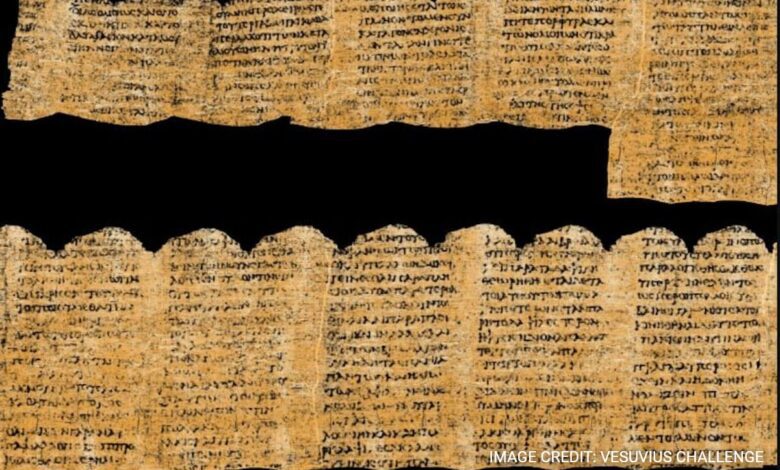Researchers use AI to read a 2,000-year-old scroll by Mount Vesuvius Volcano
The Vesuvius Challenge was initiated to speed up the research on these scrolls and offered a total of one million dollars in multiple prizes

Three researchers have been awarded a cash prize of $700,000 for their successful attempt to read a 2,000-year-old scroll, which was buried in the eruption of Mount Vesuvius, using artificial intelligence (AI). The scroll was part of the Herculaneum papyri collection, which consists of around 800 rolled-up Greek scrolls that were carbonised during the volcanic eruption of Mount Vesuvius in 79 CE that buried the ancient Roman town of Pompeii. These scrolls have suffered extensive damage and crumbled after attempts were made to roll them open.
The researchers used high-resolution CT scans to examine the scrolls, and they applied artificial technology to distinguish the ink from papyrus and decode the Greek lettering that was almost unreadable due to the damage. The team had to decrypt four passages of at least 140 characters, out of which they were able to recover 85% of the characters.
The Herculaneum papyri have been stored in the National Library of Naples and Institut de France in Paris, and have been a subject of study for scholars for many years. The Vesuvius Challenge was initiated to speed up the research on these scrolls and offered a total of one million dollars in multiple prizes.
The three researchers who won the prize included Luke Farritor, a student and SpaceX intern from Nebraska, Youssef Nader, a PhD student in Berlin, and Julian Schilliger, a Swiss robotics student. They used pattern recognition to decode the scrolls, and their joint efforts have now been able to decrypt nearly five per cent of the scroll.
Scroll’s author wrote about music, food & how to enjoy life’s pleasures
According to the contest organiser Nat Friedman, the scroll’s author was “probably Epicurean philosopher Philodemus,” who wrote about music, food, and how to enjoy life’s pleasures. The scrolls were discovered in a villa that was earlier believed to be owned by Julius Caesar’s patrician father-in-law. The villa had a mostly unexcavated property which had a library that contained thousands more manuscripts.
The successful effort of the researchers has opened up new possibilities for the study of ancient texts and their impact on history, and it is expected that these scrolls could completely rewrite the history of key periods of the ancient world.
You might also be interested in –India joins 27 nations in historic AI declaration to tackle risks and challenges



